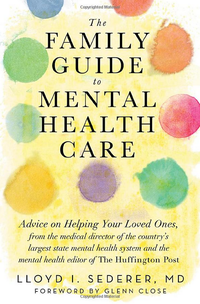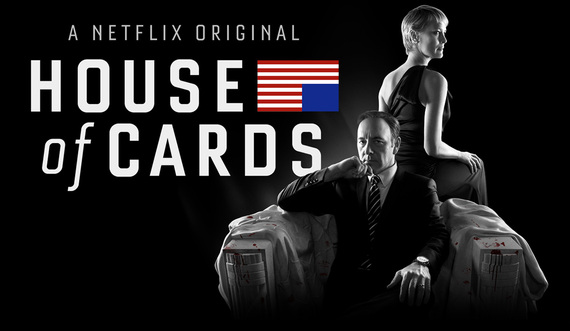House of Cards: A Miniseries Review
Lloyd I. Sederer, MD
These violent delights have violent ends.
And in their triumph die, like fire and powder,
Which as they kiss consume.
-- Romeo and Juliet
The second season of Netflix's first adventure in a self-produced miniseries has just been released. Not one episode dribbled out with a weekly ration but the entire second season up for continuous viewing on our varied wireless and cable devices -- the only limits being the viewer's appetite for this dark, fatalistic (but bloodless) tale of power as well as any human need for sleep or satisfying other natural functions.
House of Cards gave us, in season 1, Kevin Spacey as vengeful South Carolina U.S. Congressional Democrat with a drawl, Robin Wright as his elegant and perhaps even more 'take no prisoners' wife, and Kate Mara as a lion cub reporter with grown up claws for what would be the Washington Post. They bounce off one another, and off other D.C. luminaries, like atoms in a nuclear reactor. There is heat, light, acceleration and destruction. There is also unmitigated, if hard won, joy. The joy of power.
I recall what I witnessed when I lived in D.C. some time ago. Unlike New York or Los Angeles or Dallas, where money, celebrity and even professional status prevail, it is power that makes for Beltway titans. The Honorable Francis Underwood, delivered by Spacey with just the right touch of evil, is both the perpetrator and a regular commentator, offering the audience brief sotto voce asides to translate D.C. culture and his command of it.
There seems little (if any?) redeeming value to the Congressman and his maneuvers. He is either making people pay, gaining control of others by exploiting their weaknesses or ambitions, or advancing his own might. Unlike West Wing, where we saw credible DC scenarios depicting a noble, socially progressive agenda, House of Cards is about the incessant striving to dominate, as if the ends had no real meaning.
My wife asked me why I watch House of Cards. Not that she has any problem with my attention to movies or miniseries; she is a regular herself. But why this show where no one seems to have virtue, or if they do they are soon to suffer as a result. A good question -- especially since I am far from alone in looking forward to the next episode or season, late night fatigue notwithstanding.
Is there virtue in professional football play? There certainly is virtuosity. And a lot more viewers. The deft enactment of orchestrated power is a sight to behold, on the gridiron or the halls of Congress. A battle of titans fixes our attention and it is hard to divert from it. The finesse of power rendered without a trace of bodily injury, though with far deeper and often more intractable pain, is an enduring art form, even if only the province of a few.
Tragedy is the undercurrent, I think, of House of Cards: Tragic consequences to those sucked into the maw of power, the tragic cost to the multitudes whose lives depend on justice and the kindness of others, and the soul destroying that becomes the fate of those living on a diet of power and advantage. The Greeks knew tragedy. Shakespeare was one of its greatest portrait artists. Audiences amass to witness eyes gouged and kingdoms lost to vanity, greed and ambition.
There is nothing new in tragic stories. The opportunity lays when the canvas is blank and they can be painted in new and gripping ways. If you are looking for pain, dramatically portrayed with aplomb and irony, catch up with season one or start downloading and consuming season two of House of Cards. It is a tragic feast.
..................
 Dr. Sederer's new book for families who have a member with a mental illness is The Family Guide to Mental Health Care (Foreword by Glenn Close).
Dr. Sederer's new book for families who have a member with a mental illness is The Family Guide to Mental Health Care (Foreword by Glenn Close).
The opinions expressed here are solely mine as a psychiatrist and public health advocate. I receive no support from any pharmaceutical or device company.
Copyright Dr. Lloyd Sederer

